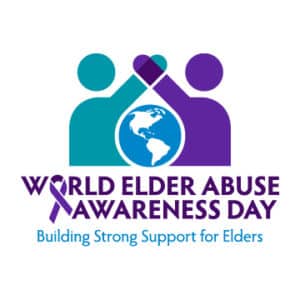This month we want to highlight two special days. The first is The Longest Day. The Longest Day is the day with the most light – the summer solstice. On June 20, people across the world will fight the darkness of Alzheimer’s through a fundraising activity of their choice. Together, they use their creativity and passion to raise awareness for the care, support and research efforts of the Alzheimer’s Association. This may look different this year due to physical distancing, but we hope many participate in this event. Again, this year I am fundraising for my birthday, June 24. Please visit my page and support my efforts. Thank you.
The second day is World Elder Abuse Awareness Day 2020. Held on June 15th each year, this is an annual international UN observance day. The day came about because of UN resolution 66/127. While this may be difficult to talk about, I want to share some information with you.
Virtually all countries are expected to see substantial growth in the number of older persons between 2015 and 2030, and that growth will be faster in developing regions. Because the numbers of older persons are growing, the amount of elder abuse can be expected to grow with it. While the taboo topic of elder abuse has started to gain visibility across the world, it remains one of the least investigated types of violence in national surveys, and one of the least addressed in national action plans. The UN aims to raise awareness of elder abuse and prevent it, and on World Elder Abuse Awareness Day, communities and the press and media can run events and highlight the danger of elder abuse and what can be done to prevent it and what to do if it is spotted.
Elder abuse generally refers to the abuse, neglect, or exploitation of a vulnerable adult over the age of 60. Some of the new changes to Ohio law include an expanded definition of exploitation, training requirements related to elder abuse, putting the state’s Elder Abuse Commission into law, and expanding the number of individuals required to report suspicions of elder abuse, neglect, or exploitation.
In Ohio, elder abuse can include: physical, sexual, verbal, and emotional abuse; neglect, including abandonment; or financial exploitation. While “financial exploitation” previously included only exploitation by caregivers, changes under House Bill 49 expanded the definition to cover the improper acts of any person who uses an older adult’s resources for their own personal benefit, profit, or gain by, among other things, deception, threat, or intimidation. Elderly people are particularly vulnerable to abuse and to being unable to defend themselves and get help as fear and infirmity can be major barriers to seeking and getting help, and sometimes spotting and challenging abuse in the elderly isn’t easy, some are isolated having outlived family and friends, and some are abused in institutions where abuse is not spotted or is covered up, and in some cases the elderly are not given priority by authorities in abuse matters.
Key facts:
- Around 1 in 6 older people experience some form of abuse, a figure higher than previously estimated and predicted to rise as populations age worldwide.
- Rates of abuse may be higher for older people living in institutions than in the community.
- Elder abuse can lead to serious physical injuries and long-term psychological consequences.
- Elder abuse is predicted to increase as many countries are experiencing rapidly ageing populations.
- The global population of people aged 60 years and older will more than double, from 900 million in 2015 to about 2 billion in 2050.
Warning signs of elder abuse may include:
- Changes in an older adult’s physical appearance, such as weight loss or unexplained bruising or bleeding
- Changes in an older adult’s personality or mood
- Changes in an older adult’s finances or money management
- A dominating, threatening caregiver or new “best friend”
- Exclusion from other family members or friends
- Changes in an older adult’s home environment
Who is legally responsible to report elder abuse?
Ohio law requires the following professionals, called “mandatory reporters,” to report elder abuse.
- Attorneys
- Doctors (including dentists, podiatrists and chiropractors)
- Psychologists
- Nurses
- Pharmacists
- Employees of outpatient health facilities, home health agency, adult care facility, residential care facility
- Firefighters
- Employees of the health department, hospital, dialysis center
- Ambulance drivers
- First responders
- Building inspectors
- Certified public accountants
- Bank, savings and loan, and credit union employees
- Real estate brokers or agents
- Notary publics
- Investment advisors
- Accredited financial planners
Any mandatory reporter who has reasonable cause to believe that an adult is being abused, neglected, or exploited (or is in a condition that is the result of abuse, neglect, or exploitation) must immediately report the suspected situation to the county department of job and family services or the local designated adult protective services agency. Failure of mandatory reporters to report alleged abuse, neglect, or exploitation can result in a fine or misdemeanor criminal charges.
We are lucky in our community to have the Coalition of Organizations Protecting Elders, of which I am the secretary. (COPE) is a community-based team of organizations in Lucas County, Ohio committed to addressing abuse, neglect, and exploitation of elders through enhanced collaboration and coordination of community resources.
Reports of elder abuse can be made to local adult protective services by calling 419-213-8663 in Lucas county or by calling 1-855-OHIO-APS (1-855-644-6277) 24 hours a day, seven days a week.

 Arista Wins Top Workplaces Award
Arista Wins Top Workplaces Award